

Kidney Disease Research Updates
Spring/Summer 2008
NIDDK News
UITN Aims to Improve Quality of Life for Those with Urinary Incontinence
 Attendees at the National Kidney and Urologic Diseases Information Clearinghouse Coordinating Panel Meeting learned about the benefits of multicenter trials and the activities of the Urinary Incontinence Treatment Network (UITN), a group of gynecologists and urogynecologists conducting urinary incontinence research supported by the National Institute of Diabetes and Digestive and Kidney Diseases in collaboration with the National Institute of Child Health and Human Development. Attendees at the National Kidney and Urologic Diseases Information Clearinghouse Coordinating Panel Meeting learned about the benefits of multicenter trials and the activities of the Urinary Incontinence Treatment Network (UITN), a group of gynecologists and urogynecologists conducting urinary incontinence research supported by the National Institute of Diabetes and Digestive and Kidney Diseases in collaboration with the National Institute of Child Health and Human Development.
Some advantages of multisite studies are that they allow protocols to be completed in less time, enable pooling of multidisciplinary expertise, and yield more generalizable results, according to Holly E. Richter, Ph.D., M.D., professor and division director, Women’s Pelvic Medicine and Reconstructive Surgery, Kirklin Clinic, University of Alabama at Birmingham. In addition, developed definitions can be used in subsequent networks and trials, and the use of common, standardized measures provides the potential to analyze data across studies.
Rectifying Problems
The UITN was created in 2000 to address some of the problems with urinary incontinence studies, according to Richter, such as poorly defined enrollment criteria and outcome measures, low rates and short-term follow-up, small sample size, and a lack of comparator groups.
Specific goals of the UITN are high-impact clinical research; better prevention, evaluation, and management of urinary incontinence; and an improved quality of life for adults with this disorder, with a focus on women. The network, which consists of nine clinical continence treatment centers and a biostatistical coordinating center, is involved in several studies, including the
Stress Incontinence Surgical Treatment Efficacy Trial (SISTEr), a randomized trial comparing 24-month outcomes of the Burch urethropexy compared with the autologous rectus fascial sling for the treatment of stress urinary incontinence (SUI) Behavior Enhances Drug Reduction of Incontinence (BE-DRI) trial, a randomized trial to determine whether combining antimuscarinic drug therapy with supervised behavioral training, compared with drug therapy alone, improves the ability of women with urge incontinence to achieve clinically important reductions in incontinence episodes and to sustain these improvements after discontinuing medication Trial of Mid-Urethral Slings (TOMUS), a randomized trial comparing the outcomes of a retropubic versus transobturator mid-urethral sling procedure for treatment of SUI
Richter suggested that for future trials and studies, researchers should consider addressing prevention of urinary incontinence and the addition of basic science considerations.
For more information about the UITN, visit www.uitn.net. For an easy-to-read booklet about urinary incontinence in women entitled What I need to know about Bladder Control for Women, go to www.kidney.niddk.nih.gov/kudiseases/pubs/bcw_ez/index.htm.
NIH Publication No. 08–4531
July 2008
[Top]
|






